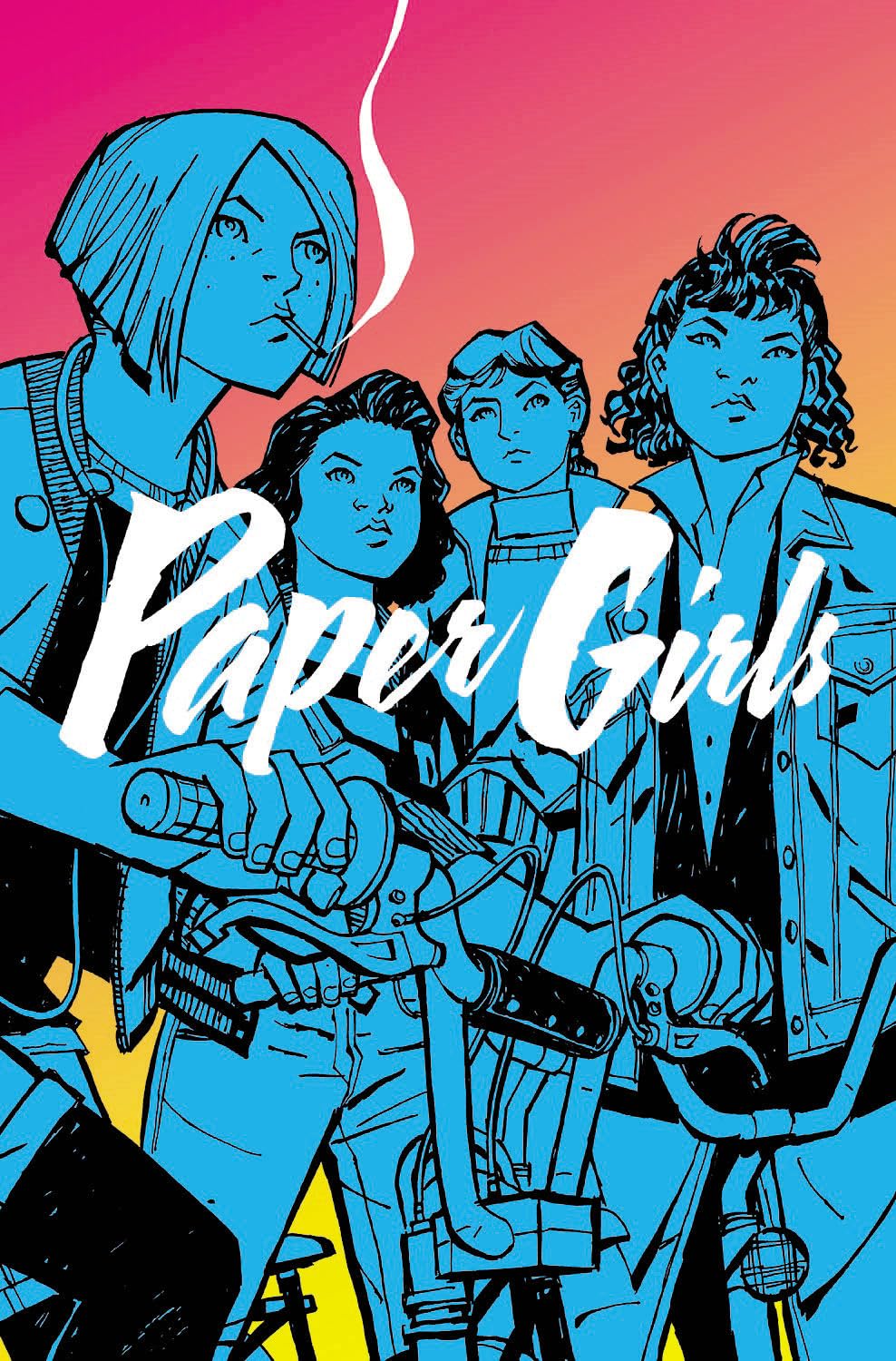By Lottie Spurgin
 Paper Girls by Brian K. Vaughan and Cliff Chiang
Paper Girls by Brian K. Vaughan and Cliff ChiangPaper Girls is an excellent series, and it was one of the first I ever sat down to really read! It follows a group of 80’s teens against world-ending circumstances. In 1988, 4 girls working for the local newspaper set out on the morning of November 1st for what paperboys call ‘Hell Day’. Halloween only ended 4 hours ago, so the rowdy teens still in costume use the opportunity to terrorize and hunt paper girls out on their bikes. The nature of the job is isolative– All the girls have their own routes that don’t overlap or intersect. But on Halloween night, they decide to run their distinctive routes in pairs for safety; Erin, the new papergirl, recommends this and the others begrudgingly oblige. Hell Day gets a lot more hellish, when the girls find themselves completely alone in the formerly populated Stony Stream, and come across a time capsule. Paper Girls follows their journey through time to get back home to normalcy, end a time-war, and preserve the deep bond they made with one another along the way.
In 2022, a Paper Girls live-action show released as an Amazon exclusive. I’ve read and watched both, and I need to get something off my chest. Books and TV are separate mediums, so it’s important to treat them like they are.
Most literary fan bases have this problem, but it’s extra relevant in the comics community– Likely because of the pop-culture pillar that is the Marvel Cinematic Universe, and the equally-large mob of angry fans watching their favorite characters be butchered and simplified for movie and TV releases. This is understandable at its core. These books are something we’re passionate about, and it’s human nature to protect and preserve something we care about. It can be anguishing watching new fans come in from a new piece of media that feels dumbed down compared to the run you liked, or you started on. It’s hard to pinpoint why this is so upsetting, but the main ones seem to be: You’ve been used to the fanbase being smaller, and full of people who all liked the same thing (not a new branch that’s sort-of that thing, but worse in your eyes) and change is scary! Your Tumblr dash and Twitter timeline is suddenly overrun with edits of actors instead of drawings, and memes and posts about moments and interactions exclusive to the new movie or show. And change is SCARY! The new actors, writers, set designers, cgi artists, cinematographers, directors, and what have you don’t get it. They’ve mistreated the story you care about. You feel from the bottom of your heart that your preferred run is better, and that other fans of the series are missing out. It’s like secondhand FOMO.
I think most of us just feel upset when these things happen, and don’t stop to think critically about why we feel this way. It’s easy to forget that a movie based on a comic you love was made with just as much love and care as the comic, just in a different way by different people. Sure, sometimes producers conjure an adaptation as a cash-grab, but it’s not a hive-mind. Hundreds of people work on shows and movies, and without a doubt a majority of those involved have passion for the source material– Or at least passion for their craft. And intentions to do the creators of the OG proud. There are more of them, but just like comics– movies are made by artists. For this reason, I reframed how I watch adaptations of my favorite media. I think of them as separate things. Inspired by the original content; An Individual creation that exists in tandem with the original, not encroaching on it. An amazing comic and a so-so movie can exist within the same franchise, without anyone thinking less of the comic. Just like new fans of a media, and original ones, can co-exist.
I think living with a positive mindset is important to our mental health as consumers. That doesn’t mean we have to like everything we watch. We definitely do not– But we shouldn’t hate anything before its conception, and we should give every artist’s work a chance. When we see choices we don’t understand, we should consider why we don’t like it, instead of just “I don’t like that.” Thinking critically, or being a critic is a commonly misinterpreted title. It doesn’t mean finding what you don’t like about a piece of media; it means finding why you like the good parts, dislike the bad parts, and understanding the methods of its creation.
These philosophies are why I– as a day one Paper Girls fan– totally love the 2022 show produced by Amazon. The show follows an alternate timeline from the comics. Most of the first episode is scene for scene, which is thrilling for fans of the GN. It then diverges from the second episode on. In the comic we follow the cast of girls jumping all over the timeline, from the past to the future wildly, anywhere but where they want to be. In the show, they make a sudden and single jump to 2019. This means we lose so many of the prehistoric scenes, or futuristic scenes that are illustrated so beautifully by Cliff Chiang. Initially, I was super disappointed. But I personally want to enjoy everything I consume, so I thought about these things more in depth.
Since the series only features a jump to 2019, we get to spend a lot more time there. In the comics, Erin meets her future self during this sequence. In the show, Erin still does this– But all of the other girls get to explore their futures, too. We get to see Mac bond with an adult version of her brother, which totally made me cry– and was never possible in the comics. We get to focus on the shift of Stony Stream, the suburbia they live in, without being regularly distracted by dinosaurs and laser beams and floating skyscrapers. We still get those things, they’re part of the series’ identity, but the show lets the girls take the limelight in a way the books never really had a chance to.
I feel that the show and the comic are both excellent pieces of media, and should both be enjoyed separately, like two parallel narratives. I love the show for its humanization of the girls, and I love the comic for its suspenseful epic. Opening our minds and hearts to new iterations of things we love makes growing up a lot easier, and the mindset shift isn’t difficult to make.
Here’s where to get started!
